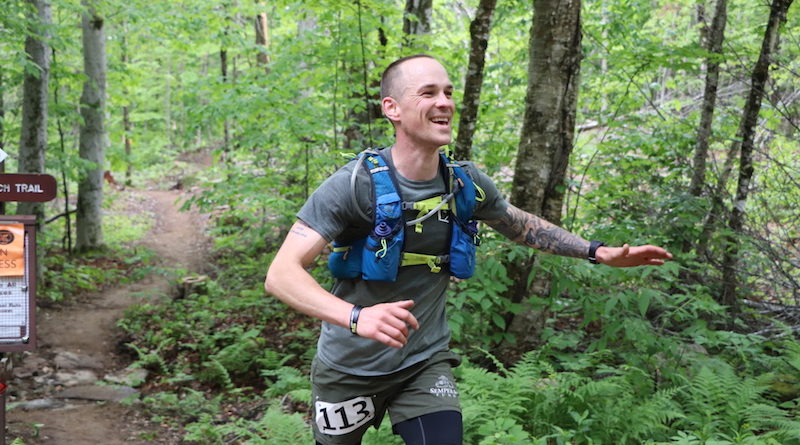Reader Athlete: The Warrior
Name: Jason Mosel Age: 33 Lives in: A log cabin in the woods of East Corinth Occupation: Supervisor at Comcast and Marine Corps Veteran who achieved the rank of Sergeant and earned a Combat Action Ribbon, Purple Heart and Iraq Campaign Medal Family: Wife, Amber; Goofy Great Dane, Gomez. Primary Sports: Endurance fanatic, ultrarunner, obstacle course racer. Hobbies: Vegetable gardening and food preservation
On March 22, Jason Mosel attempted to break the Guinness World Record for the most chest to ground burpees in 12 hours. He’s also run ultramarathons, competed in more than 20 Tough Mudders and survived a suicide attempt. Now, he wants to make sure that other Vermont veterans know they aren’t alone in their struggles with post-traumatic stress disorder.
Where are you from and what drew you to Vermont?
I grew up on an apple orchard in Waterbury, Conn. I loved being outdoors as a kid. Then, when I was a sophomore in high school, September 11 happened. I often frame it as my generation’s Pearl Harbor. A lot of us who were young then wanted to serve, to go overseas and to defend freedom. I signed up to be infantry with the Marines because I wanted to be part of the toughest branch in the military. When I graduated from high school in 2003, I went straight to boot camp. I saw three deployments—two to Iraq and one to Japan—in four years of active duty.
After three deployments in four years, the simplest thing I can say is that I lived four lives during that period. When I got out of the marines, it was time for me to reconnect with nature, but also with myself. East Corinth seemed like a place where you could get out in the woods and the quiet and do your own thing. My wife and I bought a cabin on 13 acres.
How did you become an endurance athlete?
When I got out of the Marine Corps, I was being prescribed medication to treat depression and Post-Traumatic Stress Disorder (PTSD). I felt like I was going through life in a zombie state, so I stopped taking the meds. But I wasn’t ready to face my demons. I started drinking heavily. Then one day my wife and I saw an ad on TV for the 60-day INSANITY workout. My wife said, hey, let’s do that.
During those workouts, I’d push myself to the point of exhaustion and get this shot of endorphins. But I was still drinking heavily. Then in 2013, a friend asked me to do the Tough Mudder with him at Mount Snow. It was really, really tough for me to push through those 10 miles of obstacles. But when I crossed that finish line, I got this sense of accomplishment and community I hadn’t felt in a long, long time. It was a turning point for me, and I was like, “Oh, this is my new drug.”
I stopped blaming people for my challenges and started pushing my finish line further back every time I crossed it, progressing from marathon to ultra, getting better physically and mentally and fighting my demons every day.
You mention your demons. Can you share a little about what you saw during service and what you learned from it?
During my first deployment to Iraq, our battalion lost 34 Marines. One was a very close friend of mine. That affected me a lot. I was an 18-year-old kid who had never been too far out of Connecticut before and there I was in Iraq, taking people’s lives and watching someone else’s life get taken.
During my second deployment, I really struggled with PTSD and depression. I was given a cocktail of pills by a psychiatrist to help me finish my service. It wasn’t working well and it came to a head in 2005 when I tried to take my own life while stationed in Japan. I spent a little time in a padded, white room, but was ultimately able to get through another deployment to Iraq. In retrospect, it was the beginning of the transition to who I am today.
I learned that life can end at a moment, and so to live every second as if it were your last. Sometimes it’s too short. It’s gonna get tough, but you have to persevere.
How did you decide to attempt the Guinness World Record for most burpees in 12 hours and why did you do it at night?
Burpees are terrible! If someone asked me what exercise I hate the most, I’d say burpees—so I decided to do as many as humanly possible. And I knew from my own experience that night is the hardest time for people who struggle with a mental disorder. I thought, if people can watch and see me struggle, it might motivate them to try something that works for them. I want to show people that you can beat this on a daily basis.
You knew by 1 a.m. that you weren’t going to beat the world record (4,556). Why did you keep going?
I actually didn’t care about the beginning. I wanted people to see the stuff at 4 a.m. and 5 a.m., where I’m tired, hurt and there’s no reason to go on. I wanted to show folks that no matter how tired you are, you can always go one next step. If you’re struggling with mental illness, you can go that next hour, those next few minutes.
It’s like hitting 50 miles in an ultramarathon. You don’t know if you can keep going, so you say, I’ll make it to the next tree and then decide if I want to quit. I hope that seeing what I did gave someone hope to push on in their life.
How has endurance helped you fight those battles with PTSD and depression?
I still fight this battle every single day. It’s my demon and it’s always sitting there, smoking a cig, working out, waiting for that moment in time when I drop my guard to come up and whisper in my ear: “Quit.”
Pills? Alcohol? They swept it under the rug. As I got physically stronger, I became mentally stronger. It’s not that I have an internal struggle 24-7, but I stay mentally and physically sharp so I can fight my battles when I have to. If I don’t want to get out of bed in the morning, I throw on a 40-pound pack and get up and I go for an even longer run that day.
You chose to raise money for the Josh Pallotta Fund. How did you choose to partner with them and how much did you raise?
I wanted to partner with Valerie Pallotta [the founder] because her mission is to help veterans with PTSD who are struggling with mental disorders here in Vermont. Her story hit home. Here I was, a veteran of the Iraq War, who attempted suicide and survived. Valerie is on the other end of the spectrum. She lost her son Josh, who served in the Vermont National Guard in Iraq, to PTSD and suicide in 2014. We raised $10,000 and I want to be there to support her now and in the future with other events.
What do you think is the biggest challenge veterans face coming out of the military?
The hardest thing about leaving the military is leaving a family. You’ve just become closer with these guys and girls than with anybody in your life and now it’s gone. You can stay in touch, but you’re not seeing these people every day. For anyone, veteran or otherwise who is struggling with PTSD, it’s about community. Where can I go to feel comfortable and ok, where stigma won’t follow me?
An overarching theme I’ve heard from multiple people, and experienced, is the stigma around PTSD and mental health. For myself, I thought, “You’re a man and you’re a marine. Suck it up.” There’s a feeling that if you say you’re having any type of issue, let alone that you tried to commit suicide, you’ll be looked at as weak.
How have you to dealt with that?
My wife and I are high school sweethearts. We got married after my first deployment to Iraq and she stuck with me through all of the garbage I was going through. I am an extremely lucky person to still have her in my life. When I started this fitness journey, she was right there by my side. When I was training for the burpee challenge, she’d get up in the middle of the night and come do the last thousand reps with me. She just signed up for her first ultra—the Endurance Society’ Infinitus 88K in May. I’m excited to support her in that.
How did you train for the burpee challenge and will you try for the world record again?
Every morning for four months, I took the time I woke up and multiplied that by 100 to get the number of burpees I was going to do that day. It’s a full body workout and I worked hard to stay injury free by strengthening larger muscle groups and keeping my shoulders flexible. I kept up my running routine—varying long distances with shorter runs at speed. When it comes to lack of sleep, I like to do 24-hour trainings every once in a while at the house to keep myself sharp for ultraraces. I incorporate hauling and splitting wood, rucking (carrying a very heavy backpack over long distances). Two months in, I started doing my long burpee sessions starting at 6 p.m. at night. I think I’ll try again but it will be a private thing—something I do for me.
What do you want other veterans to know?
If you see someone with a cast on, you want to open the door. But if you look at me? You might say he’s got his shit down. I’m covered in tattoos and listen to metal music (I also like to garden). Not everyone expresses their feelings in the same way, but we all need a place to go to feel comfortable and ok, where stigma won’t follow.
What’s next?
I did the Half Marathon Unplugged with a 50-pound sandbag on April 13. At the end of this month, I’m doing a Spartan Ultra Race. Mid-May, I’ll do the Toughest Mudder in Philadelphia, Pa. I’m going for the World’s Toughest Mudder in Atlanta, Ga. on November 16. This summer, I’m doing the Endurance Society’s Infinitus 100-miler in Goshen and I signed up for The Death Race in Pittsfield in July. It’s going to be awesome.
How to do a Guinness World Record Chest-to-Ground Burpee
Photos by Jason Mosel
- Start by laying flat on the ground with both arms out to the side to make sure that your chest touches the ground.
- Bring arms in and push up to a high plank position.
- In one fluid motion, bring your knees into your chest from the high plank to a crouching position.
- From the crouched position, in one motion, stand up and jump.
Featured Photo Caption: Jason Mosel at the Endurance Society’s Infinitus ultramarathon in Goshen in 2018. Photo by Jennefer Paquette.


